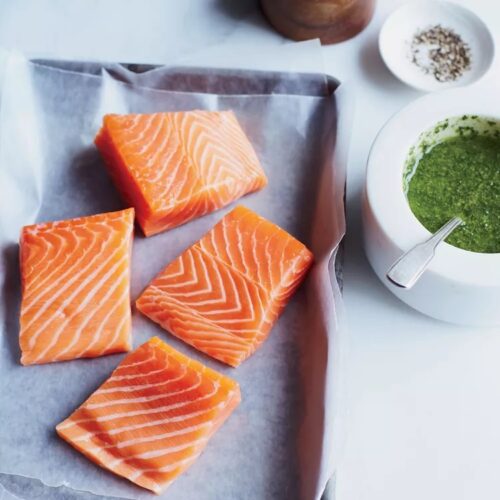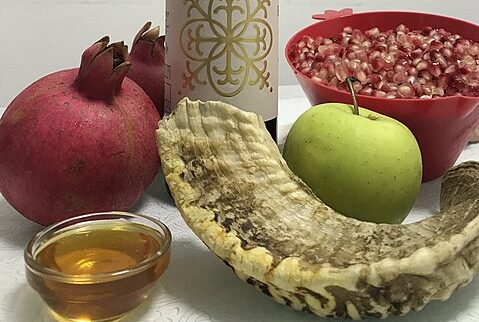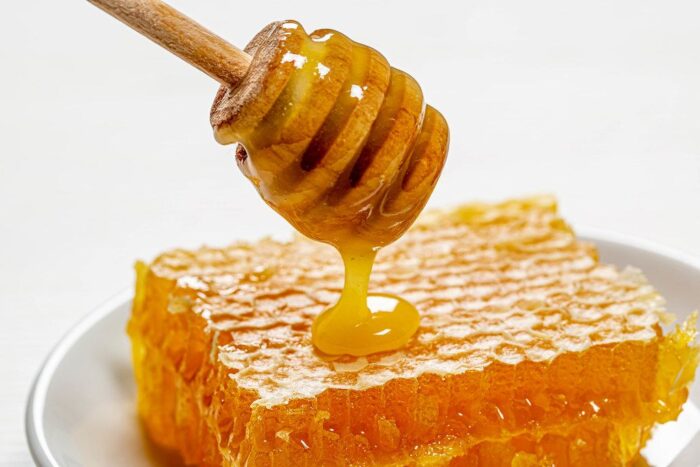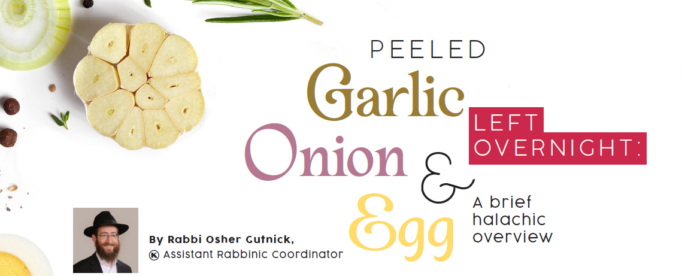WHAT IS HONEY?
Honey is a sweet and viscous liquid made by honeybees using the nectar of flowering plants. Its high concentration of fructose and glucose makes it about as sweet as sugar and a great natural sweetener. The widespread custom on Rosh Hashanah is to dip challah and apple in honey to symbolize a sweet new year.
Honey contains a mix of amino acids, vitamins, minerals and antioxidants and is also used for its anti-inflammatory and antibacterial benefits promote healing.
HOW IS HONEY PRODUCED?
Honeybees use their long tongues to suck the sugary juice – nectar, out of plants. The nectar is stored in a second stomach, also referred to as the honey stomach, until their stomach is full. Then they return to the hive and pass the nectar through their mouths to the chewing bees. The chewing bees chew the nectar for about 30 minutes and then pass it on. As the nectar is passed from bee to bee, the enzyme found in the bees’ saliva turns it from sucrose into molecules of glucose and fructose. Once the nectar is fully processed, the honeybees store it in a honeycomb cell which is made out of wax. They then slap their wings over it to evaporate the water and turn it into honey with a thick, syrup-like consistency, then seal it with wax.
As nectar is only available for a few months out of the year, the bees collect and store the honey so they have a food source throughout the year. They produce more than they consume, so the beekeeper can take some of the honey from the hive. The optimal months for collecting honey are between July and September, with the final production occurring sometime in mid-September, right around the time of Rosh Hashanah.
To extract the honey, the honeycomb is taken out of the hive, the top layer of wax is removed, and the comb is spun in a centrifuge. The honey is then filtered to remove the wax, bee parts and other impurities and packaged as raw honey. Regular honey is pasteurized before bottling. Unfiltered honey is strained to remove the larger impurities (including bee parts) but retains the pollen and other small particles.
Heat is typically used in the process to speed the processing and the filtering.
Some honey has a unique flavor due to the type of flowers that the nectar was extracted from; honey made from different types of nectar vary in color, texture and flavor. Sometimes additional flavors are added at the manufacturing facility.
IS HONEY KOSHER?
The Gemara in Bechoros 5B teaches us: “That which emerges from the non-kosher is non-kosher.” If so, why is honey kosher? After all, honey comes from bees which are non-kosher.
There are two possible explanations (Bechoros 7B): 1) honey is not considered a secretion coming from the bee itself. It is simply a flower nectar which the bee collects, stores and then expels (and the trace amounts of saliva are not considered significant enough to prohibit the honey); 2) honey is considered bees’ secretions, but there is a special learning of a pasuk that teaches us that bees` honey is kosher and an exception to the rule.
Honey with added flavors will always require a reliable certification.
Heating honey before filtering out bee parts does not pose a kosher concern; these parts only give a bad taste to the honey and, therefore, do not make it not kosher. Also, the equipment is dedicated to pure honey which doesn’t pose a kashrus concern. However, often honey is packed in industrial packaging and transported to retail packaging facilities. During the repacking process, the honey is heated for better flow through the bottling equipment and these bottling facilities may also process heated dairy and non-kosher production on the same equipment. OK Kosher recommends purchasing all retail packaged honey with a reliable certification.
Honey is one of the most adulterated foods around the world, and other sweeteners, such as corn syrup (that is not kosher for Passover), are often mixed in the honey. When buying honey for Passover it is important to look for honey that is certified for Passover.
FOREST/HONEYDEW HONEY
Forest honey, also known as honeydew honey, is not produced from flower nectar like regular honey; rather it is made from a sugary solution (honeydew) that is extracted from plant sucking insects. These insects consume sap from trees, keep some of the sap for nutrients and secrete the remaining sap as a sweet and sticky liquid on the leaves, trees and ground. This secretion is then collected by the honeybees who produce honey out of it in a similar process to regular honey.
The mainstream approach is that since the starting material (insect secretion) itself is considered non-kosher, (“that which emerges from non-kosher is non-kosher”) the honey should be not kosher. There are some lenient approaches that maintain that all types of bee’s honey are kosher. OK Kosher does not certify honeydew honey.
ROYAL JELLY
Royal jelly is a bitter tasting secretion from the bees themselves, which they produce for the consumptions of young bees in small amounts, or for the future queen bee in very large quantities. There are claims for the health benefits of raw jelly in humans. Raw jelly is generally considered non-kosher because, unlike honey, it is a secretion that comes from the bee itself.
BEE POLLEN
Bees store and feed on of flower pollen as well. Pollen from the flowers is attached to the bees’ hair, and is then pressed into pellets with nectar or saliva in baskets found on the bee legs, and then stored in their hives. Bee pollen is considered kosher for the same reason as honey, and is consumed for its health benefits.
PROPOLIS
The propolis is a glue produced by bees by mixing resin collected from tree sap with beeswax, to seal small unwanted openings in their hive. Propolis is used for its antibacterial benefit and is considered kosher in its pure form.
WAX
Beeswax is secreted from the wax glands of the bees. It is considered an inedible waste product, and therefore not a kosher concern, and is used as additives in many kosher food products, primarily as coatings and in the flavor industry.
THE IMPORTANCE OF BEES
The transfer of pollen that happens when bees fly from one blossom to another is essential for the growth and reproduction of over 100 types of produce. Pollination is necessary for trees to produce fruit, plants to produce fruits and vegetables, and for trees and flowers to reproduce. Unfortunately, bees are dying at an alarming rate, almost 48% loss per year, mostly due to viruses and severe weather. The sharp decline in bee population requires herculean efforts on the part of commercial bee keepers to rebuild hives and maintain their colonies.
Rabbi Hendel is a member of the OK Kosher Vaad HaKashrus.


 EN
EN  ZH
ZH  KR
KR  BR
BR  ES
ES  IN
IN  IL
IL 




